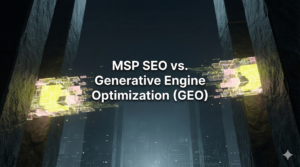Did you know that organic search results need to pass over 200 ranking factors before Google considers showing them in the SERPs?[1] Do you also know that a website’s position in the sponsored ad section is primarily influenced by the highest bidder and partially by your Ad Rank?[2].
So the question is, “How is ranking different when comparing PPC vs. SEO?
This post discusses everything you did to know about PPC and SEO rankings. We’ll also explore real-life case studies of two eCommerce clients who generated sales via PPC and SEO to demonstrate how rankings differ.
Be sure to watch our SEO playlist for a comprehensive masterclass on SEO. Let’s get started.
PPC vs. SEO: How is Ranking Different in Google SERPs?
1. The Pay-Per-Click (PPC) Ranking Method
PPC ads, like Google Ads, are strategically positioned at the top of search engine results pages (SERPs), typically above organic listings. Your ad’s position is determined by a bidding system, where you compete with other advertisers for the most relevant keywords. The higher your bid and the better the ad quality (Ad Score), the higher your ad will rank.
With this bidding system, you can achieve top placement on Google almost instantly, making PPC ideal for the following:
- Launching new products or services
- Running time-sensitive promotions
- Targeting specific audiences with laser precision
Pro-tip: LinkedIn Ads and Facebook Ads function differently from Google Ads. Consider skimming the provided resources before deciding which type of PPC you need.
2. Search Engine Optimization (SEO) Ranking Method
Google’s complex algorithm considers numerous factors, such as website content, user experience, and backlinks, when determining organic SEO rankings. Improving your ranking involves SEO keyword research, optimizing your website for relevant keywords, and creating high-quality content.
While SEO takes longer to yield visible results, it offers several advantages:
- Cost-effective: You don’t have to pay for every click once your website ranks organically.
- Longevity: High SEO rankings can generate consistent traffic for months or years.
- Increased brand authority: Ranking highly in organic search results builds trust and credibility with potential customers.
How is PPC Different Than SEO?
There are only two ways to bring your website to the top of the first page of Google. The first is Google Ads or Pay-per-Click (PPC) for Google, and the second is Search Engine Optimization (SEO).
However, for SaaS companies aiming to build a strong brand presence, combining SEO with SaaS PR can be a powerful strategy. Learn more about this approach in our guide on SaaS PR Agency, where we cover how PR can enhance your long-term growth.
One key aspect of managing Google Ads effectively is incorporating negative keywords. By using negative keywords, you can prevent your ads from appearing in irrelevant searches, ensuring your budget is spent more efficiently and only on the most relevant audience. Google Ads requires money and expertise, while SEO requires time and effort.
Here is how.
Ranking on Google is About Selecting Which Space to Target on SERPs
To understand how ranking is different when comparing PPC vs. SEO, you need to know how Google divides the page layouts for the search engine results pages (SERPs).
#1: The Paid or Sponsored Section
Google makes money by selling advertising, and the top of the SERPs is the most valuable position, with over 25% of the total web traffic[3]. Google has reserved this position for advertising, and companies bid using an auction-based system known as Google Ads (previously known as Ad Words). This allows the highest bidder to display their ad in this space.
Depending on how competitive the niche is, Google may display up to four competing adverts in this prime space[4], with the highest bidder taking the topmost position.
Here is a screenshot of sponsored ads for the search query: ‘expert software development services.’
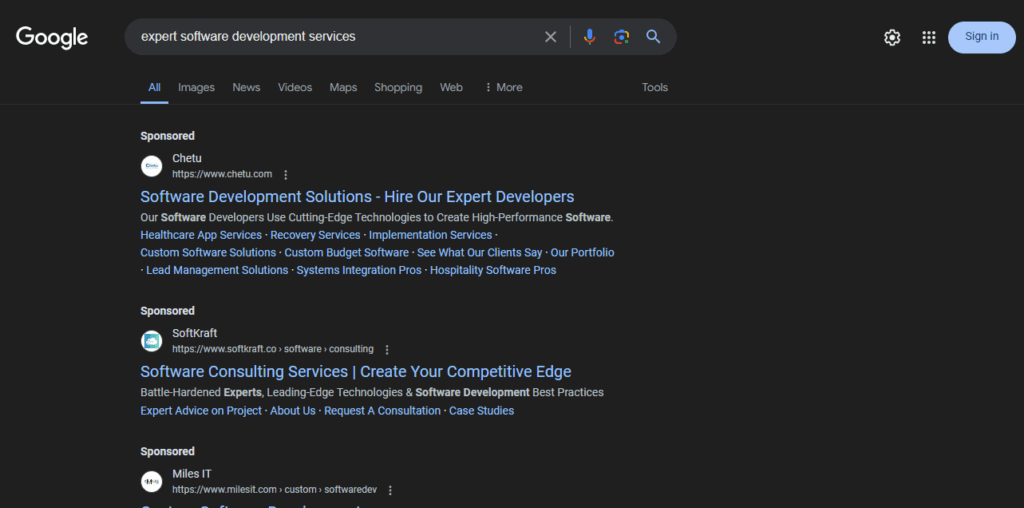
There you have the Google PPC model, which helps Google generate 77.4% ($237B) of its total revenue every year[5].
#2: The Places Section with Google My Business (GMB) Profiles
Directly below this ad space is often a map of the businesses operating in your area. Google displays the map if your search query involves a service-related keyword, such as expert software development near me.
Seeing GMB profiles depends on your search query and whether a GMB profile has a website optimized for the keyword you searched.
With the suffix ‘near me,’ you almost always get a ‘Places’ section like this one below:
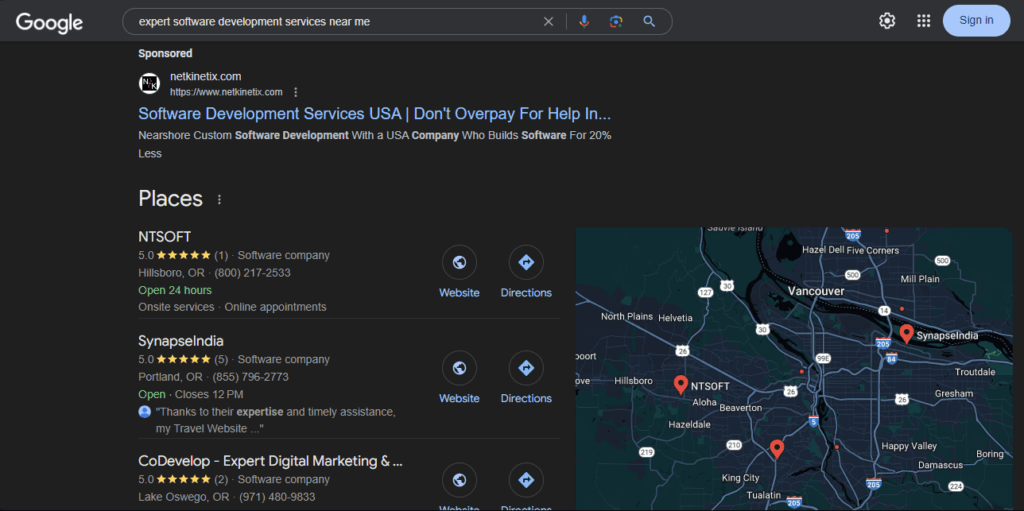
#3: People Also Ask Section
The ‘People Also Ask’ section is often below this map or an organic search result if there is no places section. It typically shows 4-6 quick, frequently asked questions about your search query. Google doesn’t generate them independently; instead, this section amalgamates the top-ranking websites and a highly filtered version of your search query.
Using our previous search query, expert software development services, you can see that the ‘People Also Ask’ section is below an organic listing after the sponsored section (and there are no GMB profiles).
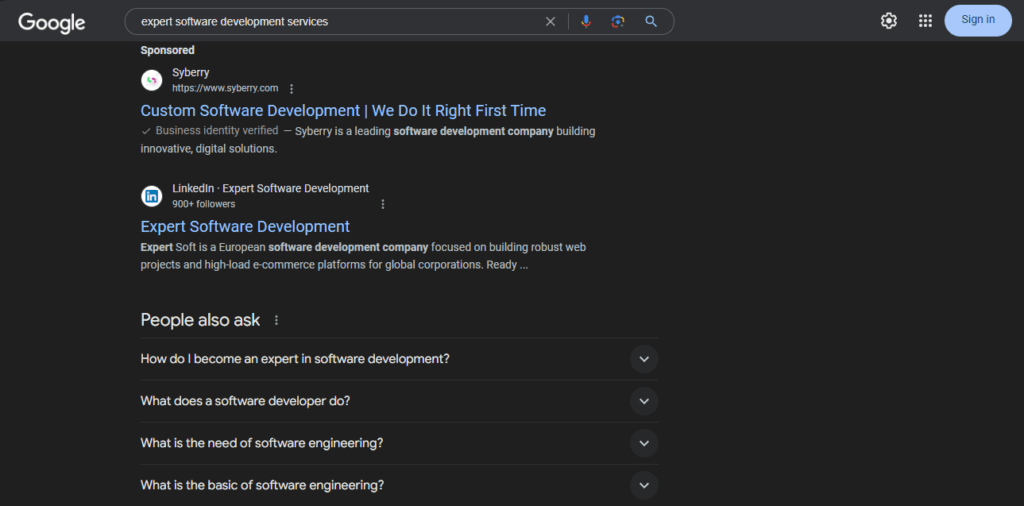
#4: The Organic Search Listings
Finally, after these 3 elements comes the list of the organic search results, usually towards the middle or the end of the search results page. These are the free listings that deliver the best quality search results. Consider the organic SERPs for the same keyword.
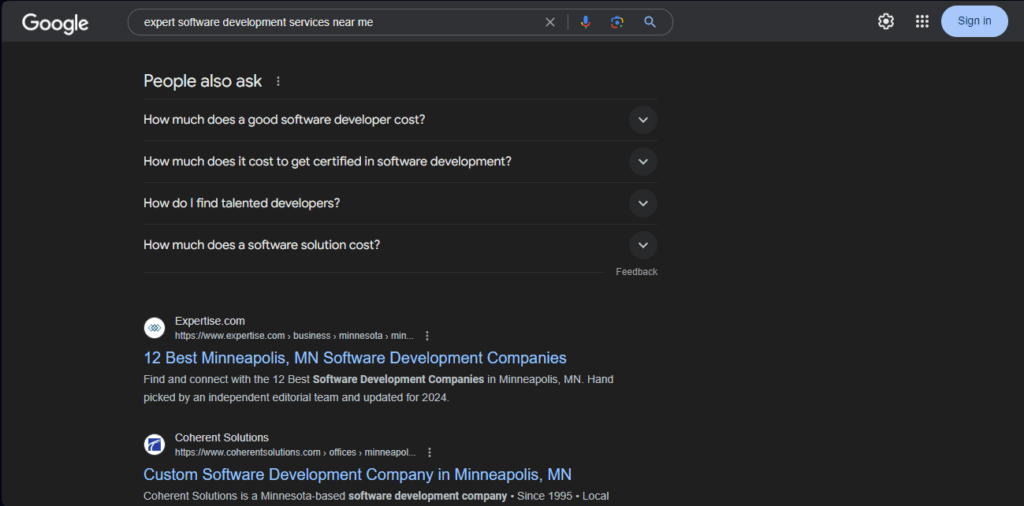
Studies reveal that 94% of users find organic results of much more value and skip paid/sponsored sections[6]. This preference is because Googe’s outstanding AI-powered algorithm ranks the organic results based on relevance and not by the largest marketing budget.
How Do PPC and SEO Ranking Methods Work?
1. The SEO Ranking Method
For your website to be displayed in the organic search, it must accommodate the algorithm to rank it. In short, you will need SEO.
Google has bots called web crawlers that search the entire internet to index all the websites. These bots are essentially just lines of code, but they record essential information from the websites and then rank each according to Google’s strict criteria.
Google then displays the best results at the top of the organic search section. It takes time for Google’s algorithm to move your website higher in the SERPs’ page ranking system. While this requires ongoing effort and input, the benefit is that it has long-lasting effects.
2. The PPC Ranking Method
Conversely, PPC can deliver almost instant results. It targets specific keywords but requires money and expertise for a Google Ad campaign. Discover the keywords your potential customers would use when searching for your product or service and then bid in an auction-based pricing system.
You can set daily/monthly budget limits and customize your landing pages for key search words to improve your conversion rate. However, your Ad disappears once you have reached your Google Ad budget limit.
It’s advisable to utilize Google Ads when starting a new business. It can help you quickly launch your business and generate cash flow. However, it’s vital to prioritize the SEO of your website for long-term success consistently.
Now we’ve answered the question, “How is ranking different when comparing PPC vs. SEO? Let’s explore which is more measurable.
Is PPC or SEO More Measurable?
Here is the simplest answer for you:
“PPC offers greater measurability with readily available PPC metrics, but SEO measurement requires interpreting broader data and trends over time.”
| Metric | PPC | SEO |
|---|---|---|
| Measurability | Highly Measurable | Less Direct |
| Focus | Clicks, Conversions | Organic Traffic, Rankings |
| Examples | Impressions, Clicks, CTR, Conversions | Organic Traffic, Keyword Rankings, Bounce Rate, Average Time on Site |
Does PPC Increase SEO Ranking?
Many clients ask us the same question: will PPC help improve our SEO ranking? It’s a great question to ask but also the trickiest to answer.
We tell them:
“No, PPC won’t directly boost your SEO ranking, but it can offer indirect benefits. Essentially, PPC can be a tool to inform and enhance your SEO strategy.”
Here’s how.
1. Increased Visibility
PPC ads place your brand at the top of search results, grabbing user attention and potentially influencing them to remember your brand for future organic searches.
2. Brand Awareness
Repeated exposure through PPC ads can build brand recognition, making users more likely to click on your organic listings later.
3. Improved CTR
Studies suggest PPC ads can increase organic click-through rates (CTR) for relevant keywords. Higher CTR can be a positive SEO signal to search engines.
4. Keyword Testing
PPC campaign data provides valuable insights into keyword performance. You can use this data to identify high-converting keywords for SEO optimization.
Case Studies to Show How Ranking is Different When Comparing PPC vs. SEO in Real-Time
Search engine optimization (SEO) and pay-per-click (PPC) advertising are both powerful tools for driving traffic to your website. However, when it comes to ranking on Google, they work in very different ways.
We have two case studies to make this comparison.
Case Study 1: PPC Rankings for Icy Bear Were Fast and Focused
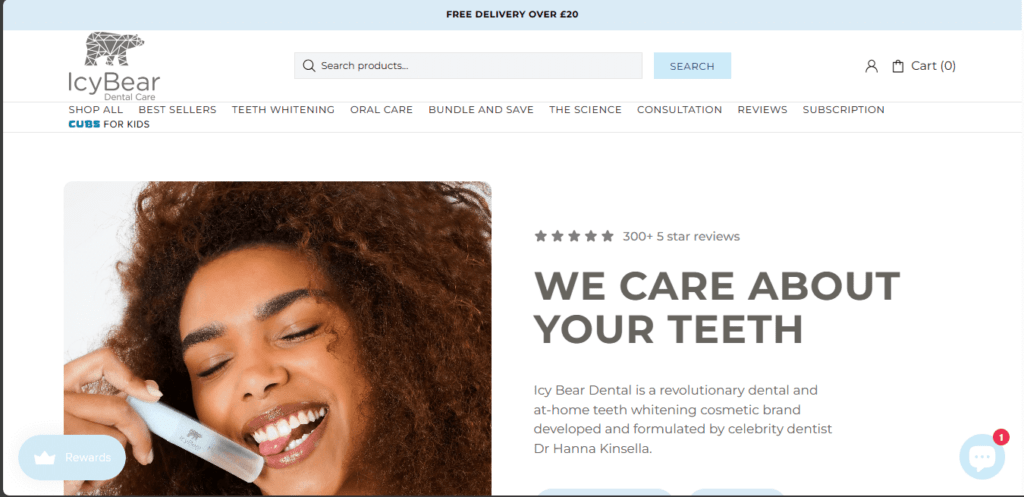
NUOPTIMA helped Icy Bear, a dental company offering teeth whitening products, achieve impressive results through PPC advertising. They were looking for a fast way to increase sales, and PPC delivered:
- Google Ads: Icy Bears spent £12,000 on a Google Ads campaign that generated £165,000 in sales, resulting in a phenomenal 13x ROAS. This campaign also achieved a high click-through rate and a strong conversion rate.

Case Study 2: SEO Rankings for Hidden Botanics Were Slower But Sustainable

NUOPTIMA also helped Hidden Botanics, a company selling sustainable dried and preserved wedding flowers, achieve significant results through SEO. Their website was underperforming despite reaching promising spots in search results.
We identified website structure issues and implemented a comprehensive SEO strategy, including:
- Technical website optimization to improve loading speeds and user experience
- Content creation, including blog posts and product page descriptions optimized for relevant keywords
- Backlink building to increase website authority
The results speak for themselves:
- 144.92% increase in purchases
- 139.78% increase in total revenue
- 165.714% increase in organic traffic
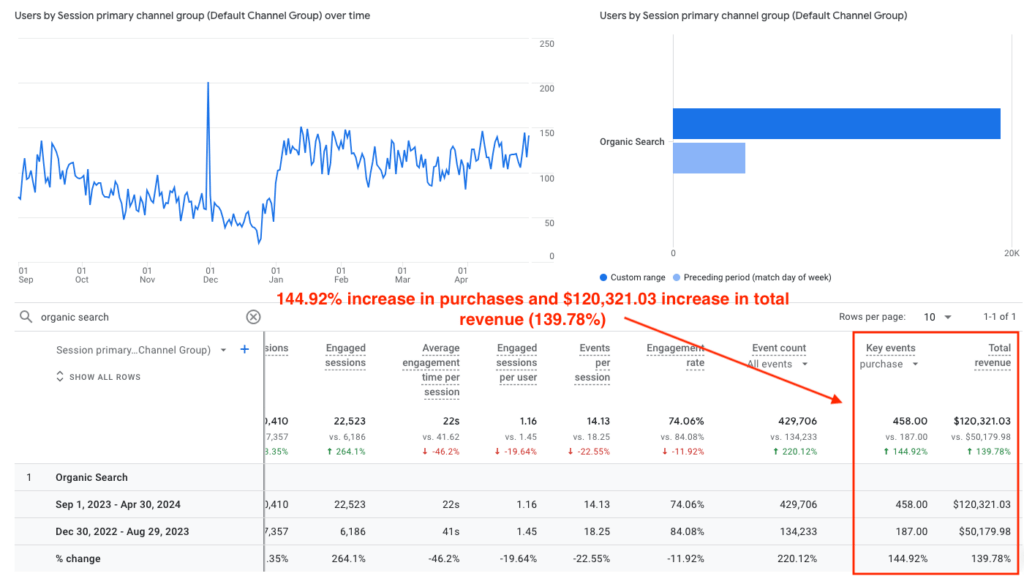
Time, Sales, Resources, and ROI in PPC vs. SEO: A Comparison of Icy Bear and Hidden Botanics
The case studies of Icy Bear (PPC) and Hidden Botanics (SEO) showcase the effectiveness of both strategies in achieving e-commerce success. However, they take vastly different approaches in terms of speed, resource allocation, and return on investment (ROI).
Here’s a side-by-side comparison to highlight these key differences:
| Metric | Hidden Botanics (SEO) | Icy Bears (PPC) |
| Campaign Duration | 6 months (September 2023 – March 2024) | —- |
| Sales Increase | 144.92% | Total sales generated were £165,000 |
| Resources Invested | SEO expertise, content creation, backlink building (ongoing) | £12,000 ad spend (Google Ads) on PPC campaign |
| ROI | Not directly measurable for SEO, but organic traffic increased by 165.714% | 13x ROAS for the Google Ads campaign |
The Bottom Line: How is Ranking Different When Comparing PPC to SEO?
PPC offers a fast track to the top. By strategically bidding on relevant keywords, you can place your ads at the user’s fingertips, generating instant website visibility.
Conversely, SEO is a long-term approach to slowly crawl your way up Google’s ranking system. It requires consistent effort in creating high-quality content, optimizing your website, and building authority to outperform your competitors and eventually claim your position on the first page in SERPs. If you’re aiming to expand your reach globally, focusing on international SEO can be a game changer, ensuring your business ranks across multiple regions and languages.
However, managing PPC and SEO can be demanding, and the Icy Bear and Hidden Botanics case study is the best example.
Often, the most challenging part is deciding whether a PPC or an SEO strategy is right for you. Chances are you may need one or both of them. If you’re looking to understand how SEO strategies specifically benefit cybersecurity businesses, explore this comprehensive guide to cybersecurity SEO.
So, how do you decide?
Data-driven SEO Agencies Can Help You Make the Right Decision
The answer is sorting, analyzing, and interpreting the data your search console, site audits, and reports tell you. As you might have guessed, this is a team’s job rather than an individual’s effort alone.
SEO experts and full-time trained PPC specialists will help you devise whichever route you want.
Feel free to explore our SEO services. Your first 30-minute marketing call is free!
Make Your Website the Top 10 in SERPs
References
- Google’s 200 Ranking Factors: The Complete List (2024) (backlinko.com)[1]
- Get your ads to show among top ads – Google Ads Help[2]
- Over 25% of People Click the First Google Search Result[3]
- SERP Features: Ads Top[4]
- Organic vs. Paid Search: (84 Astonishing) Statistics for 2024 (highervisibility.com)[5]
- 11 Legitimately Scary PPC Stats Every Advertiser Should Know (+Survival Tips)[6]

